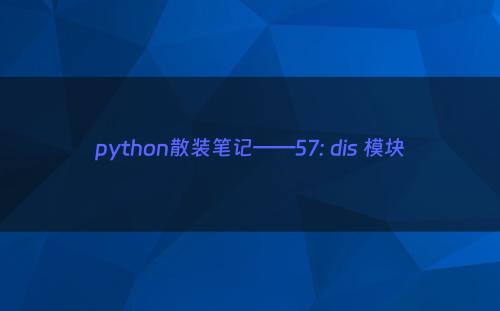1: 什么是 Python 字节码?
Python 是一种混合解释器。运行程序时,它首先将程序组装成字节码,然后在 Python 解释器(也称为 Python 虚拟机)中运行。标准库中的 dis 模块可用于通过反汇编类、方法、函数和代码对象,使 Python 字节码具有人可读性。
>>> def hello():
... print("Hello, World")
...
>>> dis.dis(hello)
2 0 LOAD_CONST 1 ('Hello, World')
3 PRINT_ITEM
4 PRINT_NEWLINE
5 LOAD_CONST 0 (None)
8 RETURN_VALUEPython 解释器基于堆栈,使用先进后出系统。

Python 汇编语言(字节码)中的每个操作码 (opcode) 都从堆栈中获取固定数量的项目,并返回堆栈中固定数量的项目。如果堆栈中没有足够的操作码,Python 解释器就会崩溃,可能没有错误信息。
2: dis 模块中的常量
EXTENDED_ARG = 145 # All opcodes greater than this have 2 operands
HAVE_ARGUMENT = 90 # All opcodes greater than this have at least 1 operands
cmp_op = ('<', '<=', '==', '!=', '>', '>=', 'in', 'not in', 'is', 'is ...
# 比较器 id 列表。这些索引在某些操作码中用作操作数
# 这些列表中的所有操作码都有各自的操作数类型
hascompare = [107]
hasconst = [100]
hasfree = [135, 136, 137]
hasjabs = [111, 112, 113, 114, 115, 119]
hasjrel = [93, 110, 120, 121, 122, 143]
haslocal = [124, 125, 126]
hasname = [90, 91, 95, 96, 97, 98, 101, 106, 108, 109, 116]
# 操作码到 ID 的映射
opmap = {'BINARY_ADD': 23, 'BINARY_AND': 64, 'BINARY_DIVIDE': 21, 'BIN...
# 从 id 到操作码的映射
opname = ['STOP_CODE', 'POP_TOP', 'ROT_TWO', 'ROT_THREE', 'DUP_TOP', '...3: Disassembling 模块
要反汇编 Python 模块,首先必须将其转换成 .pyc 文件(Python 编译)。为此,运行
python -m compileall .py 然后在解释器中运行
import dis
import marshal
with open(".pyc", "rb") as code_f:
code_f.read(8) # Magic number and modification time
code = marshal.load(code_f) # Returns a code object which can be disassembled
dis.dis(code) # Output the disassembly 这将编译一个 Python 模块,并输出带有 dis 的字节码指令。该模块从未被导入,因此可以安全地与不信任的代码一起使用。
